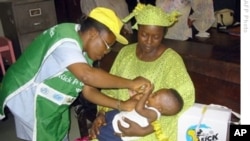In 1988, at the World Health Assembly, the United States, joined by all nations, pledged to eradicate polio. In his speech at the United Nations General Assembly meeting in New York, President Barack Obama reiterated the US commitment to work with global partners to rid the world of a virus responsible for the majority of paralysis and disability in children. His statement of support built on his 2009 speech in Cairo, where he announced a global effort, in partnership with the Organization of the Islamic Conference, or OIC, to eradicate polio.
Together, the US and OIC have worked diligently to support affected countries to vaccinate children and establish robust disease surveillance systems, to increase community awareness about the safety and importance of immunization and to identify new sources of funding to close the resource gap, especially among OIC member countries.
The global drive to eradicate the disease – the Global Polio Eradication Initiative - began in 1988. At that time, about three hundred fifty thousand cases were diagnosed annually, mostly in children under the age of three. Since then, the Initiative has succeeded in reducing annual reported cases by 99%; so far this year, just 682 cases of polio have been reported worldwide.
"We are [so] close to the goal of final eradication but we also recognize the fragility of this progress," said U.S. Special Envoy to the Organization of the Islamic Conference, Rashad Hussain at a panel discussion on Innovative Partnerships for Polio Eradication.
"This last push will require renewed international commitment, cooperation and community involvement."
Since the Global Polio Eradication Initiative began, the U.S. has provided $1.8 billion in funding, as well as extensive technical support from the Centers for Disease Control and Prevention and the U.S. Agency for International Development. As well, polio eradication is a component of President Obama's Global Health Initiative.
"For the Obama Administration, the eradication of polio is a key foreign policy objective," said Special Envoy Hussain. "Polio is a fully preventable disease, one for which we have had the expertise and technology to address for decades. And we are finally this close to the end. Let us move forward and use this opportunity to eradicate this devastating disease."
"We are [so] close to the goal of final eradication but we also recognize the fragility of this progress."




